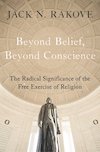Jack Rakove, the Pulitzer-Prize winning historian, is back with another prize-worthy book, Beyond Belief, Beyond Conscience, a history of religious freedom in America. While Rakove warns readers that Beyond Belief is an “intentionally provocative work,” it was, at least to this reader, quite refreshing and reassuring during an era of fake news and alternative facts.
Instead of Virgil guiding us through Dante’s nine circles of hell, it’s Thomas Jefferson and James Madison who walk readers through the intellectual history of religious freedom in America. The sages of Monticello and Montpelier laid out the principles of religious liberty and disestablishment, more commonly known as the separation of church and state.Rakove traces these principles from the earliest colonial settlements and European Enlightenment, to the American founding, and through the subsequent legal battles at the Supreme Court. This latter tour includes the battles brought on by the birth of the Mormon religion, the Ohio Bible wars, the Pledge of Allegiance cases, all the way up to the court’s last term.
Rakove isn’t one to waste words, so Beyond Belief is neither exhaustive nor exhausting. Rather, its 187 pages are packed with fascinating history told with Rakove’s familiar verve. For instance, when learning about the evangelical reform agenda of the nineteenth-century, which included attempts to close post offices on Sundays, Rakove explains that, at that time, the “post office was rarely a separate building; it was usually found in a store or tavern, and many American males were all too happy to favor a healthy libation or two over the hymns and the sermon.” Close the post office and drive sinners into the pews.
Importantly, Rakove separates personal religious views (i.e. “I don’t agree with same sex marriage”) from views about religious freedom as a right (i.e. “I refuse to make a cake for a same sex wedding”), and both from how that right is furthered by the disestablishment of religion. Beliefs are different from action and speech, but Rakove also argues, “the radical significance of the free exercise of religion inheres in its recognition of the moral autonomy of individuals, and that this recognition marks the true beginning of the liberal project.” In other words, the differences between belief and action and speech are important, but more so because they all show a founding desire to protect and foster individual freedom. Rakove’s writing shows, without openly proclaiming, that this nuance is sadly lacking in today’s conversations and Supreme Court opinions.
Some scholars, in an era of rising Christian Nationalism, are trying to downplay the influence of Rakove’s guides, Jefferson and Madison, on the American government’s relationship with religion in an effort to argue that America is a Christian nation. Rakove euthanizes such attempts with that award-winning prose: “It is entirely proper to regard the Religion Clause [of the First Amendment] as Madison’s text and Jefferson’s legacy.”
Simply by presenting an accurate history, the book illustrates an original American principle: that there is no freedom of religion without a government that is free from religion; without a secular government. It’s not just minority religions, or religions sliding along the demographic scale toward that status, that ought to fight to uphold the principle, but any truly devout citizen. As Madison and Rakove explain on page one, “religion flourishes in greater purity, without the aid of government.”
While Madison thought religion would likely flourish without government support, Jefferson believed that open theological debate, divorced from a state with the power to punish heresy, would lead to an enlightened populace. One of the interesting differences between the two that other books, mine included, gloss over.
Madison seems to have been correct. White evangelicals—or, more accurately, Christian nationalists—have sacrificed the purity of their religion on the altar of political power, leading to a demographic exodus.
With “Madison’s Razor” Rakove suggests a simplified method for analyzing legal questions that arise when personal religious beliefs collide with the law. He argues that “when one wields Madison’s razor, the tension that modern commentators find between the Establishment and Free Exercise clauses dissipates.”
Rakove proposes two premises to determine the relationship. First, the best course is for us to treat religion as a matter of private belief and a voluntary, which is to say non-compulsory, association. Second, the more religion and government overlap, the more religion will be seen as “one more sordid, corrupt interest.” The razor is less an innovation than a historical summation, described by Rakove thusly: “Disestablishment promoted free exercise, and free exercise made establishment superfluous.”
Beyond Belief recounts this history, and, while Rakove touches on the present, his focus is the past. But it’s impossible to read Beyond Belief and not notice that, in their desperation to “make America great again” Trump, Pence, and the other Christian nationalist politicians and judges have turned this simple founding American principle on its head.
Instead of guaranteeing free exercise for everyone, they’ve sought to privilege one particular strain of conservative Christianity at the expense of everyone else. They’ve perverted this historic protection, fashioning this shield into a cudgel. Religion was always in danger of becoming “a motive to oppression” as Madison explained. And he’s been proven correct with this current and ongoing weaponization of religious freedom.
Examining an early Supreme Court case involving religion and government, Rakove explains that the disestablishment of religion was a way to guarantee religious freedom and likens it to a secular revelation. It was, he writes:
“[A]nother form of revelation than the one given in Torah, the Gospel, and the Koran, but it was no less illuminating. Keeping faith with the wisdom of Madison and Jefferson had its own virtues because it articulated a civic vision that many Americans still admired.”
Let’s hope Beyond Belief renews that admiration and restores this understanding of American history and our law.






